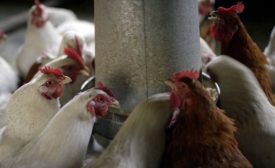Meat/Poultry
Improved Sampling and Testing are Foundational to Poultry Safety
To what extent does poultry contribute to cases of salmonellosis, both directly and indirectly, and is there more the industry can do to protect public health?
April 9, 2024
Never miss the latest news and trends driving the food safety industry
eNewsletter | Website | eMagazine
JOIN TODAY!Copyright ©2024. All Rights Reserved BNP Media.
Design, CMS, Hosting & Web Development :: ePublishing










